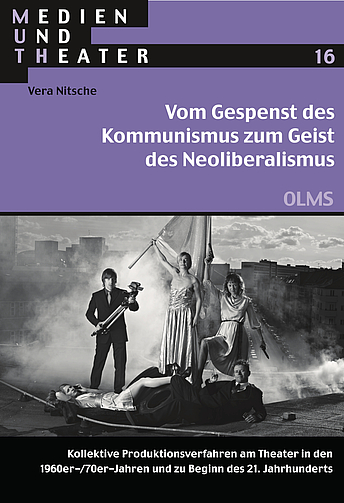Nitsche
Vom Gespenst des Kommunismus zum Geist des Neoliberalismus
ISBN 978-3-487-16037-5
englischSince the beginning of the 21st century the theatre collective has enjoyed a major comeback. The new collectives seem to have a certain aesthetic something that speaks to the younger generation of audiences and makes theatre suddenly exciting again. In the early 1970s the collective practice of theatre was driven by a generation of young theatre-makers from the student movement and was a direct expression of the new left-wing spirit of the age. So can the current renaissance of the collective be understood as a repoliticisation of the theatre or even of society itself? Using as examples the Schaubühne am Halleschen Ufer and the groups She Pop and Gob Squad, this study examines collective production practices in the theatre of the 1960s and 70s and of the early 21st century. While the earlier collectives were universally understood as the theatrical anticipation of socialism, the current discourse is characterised by a heterogenisation of positions. Today’s theatre collectives are seen on the one hand as pioneers of the neoliberal deregulation of the theatre system, while on the other hand their working practices are perceived as a new form of political expression. Vera Nitsche works in the fields of theatre studies and German studies. She gained her doctorate in a Franco-German Cotutelle programme (Universität Hildesheim / Sorbonne Nouvelle Paris 3) is an alumna of the agrégation d’allemand. She currently works as a German teacher in southern France and is a visiting lecturer at the Université Aix-Marseille.
Seit dem Beginn des 21. Jahrhunderts erleben die Theaterkollektive ein großes Comeback. Die neuen Kollektive scheinen das gewisse ästhetische Etwas zu haben, das die junge Zuschauergeneration bewegt und Theater plötzlich wieder spannend macht. In den frühen 1970er-Jahren wurde die kollektive Theaterpraxis von einer studentenbewegten Generation junger Theatermacher getragen und war ein direkter Ausdruck des neulinken Zeitgeists. Ist die aktuelle Renaissance des Kollektivs also als eine Repolitisierung des Theaters oder gar der Gesellschaft zu verstehen?
Am Beispiel der Schaubühne am Halleschen Ufer sowie der Gruppen She She Pop und Gob Squad beschäftigt sich diese Studie mit den kollektiven Produktionsverfahren am Theater in den 1960er-/70er-Jahren und zu Beginn des 21. Jahrhunderts. Während die früheren Kollektive einhellig als der theatrale Vorgriff auf den Sozialismus verstanden wurden, ist der aktuelle Diskurs von einer Heterogenisierung der Positionen geprägt. Die heutigen Theaterkollektive werden einerseits als die Wegbereiter der neoliberalen Deregulierung des Theatersystems angesehen, andererseits werden ihre Arbeitsweisen als neue Ausdrucksformen des Politischen wahrgenommen.


